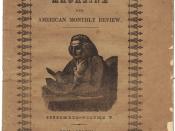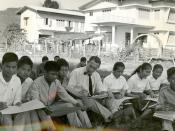Since the narrator keeps a chronological order throughout his description of his visit. I too will follow this order in an attempt to decode when events and ideas are being explained to the reader.
The Fall of the House of Usher is given in the first person narrative. It is one man's story of a trip to visit a childhood friend. A friend that he has grown distant from; and now is taken by the physical and mental changes that has occurred during his absence. The narrator is determined to paint a picture of the feelings that he is encountering throughout the story. Albeit the story is thick with symbolism, there are only a few moments that truly can define the events that transpire. It is these moments that define the narrator's actions. The first action that must be analyzed is why would the narrator come in the first place? His long estranged friend Roderick Usher had sent him a letter.
" A letter, however, had reached me in a distant part of the country-a letter from him-which, in its wildly importunate nature, had admitted of no other than a personal reply." (144.18) The narrator goes on to imply that the he was guilted into going to see his long lost friend by saying: "it was the apparent heart that went with his request". (144.25) Nowhere does the author give the impression that he is delighted to see his friend. It appears that he is compelled to go by guilt or maybe by curiosity. It would be natural to want to know what could be so wrong with his boyhood friend.
It becomes evident from the opening that the narrator is has the impending feel of gloom as to what may be in store for him. It is not until he sees his estranged friend, Roderick, that for the first time his fears are validated. He is first taken back by the physical changes that have occurred: "Surely, a man had never before so terribly altered, in so brief a period, as had Roderick Usher." (146.9) Obviously the narrator was not prepared for what has become of his friend. So much that he even: " doubted to whom I spoke". (146.20) This allows the narrator to continue painting a setting of gloom for the reader.
Worse than the physical changes that have occurred is Roderick's mental state. The narrator allows us glimpses of the terror that has plagued his friend by telling us: "To an anomalous species of terror I found him a bounded slave." (147.3) He further explains that Roderick is: "enchained by certain superstitious impressions in regard to the dwelling." (147.12) This is the first time that he confirms the reader's suspicions that there may be a connection to his friend and the house.
Later in the story the reader is introduced to the fact that Roderick has a sister. (Something that the narrator did not know, even though they were boyhood friends.) Roderick explains to the narrator that his sister is dying and that she will succumb soon. After a few nights in the house, the narrator is made aware that the sister has passed. He is requested to aid Roderick in preserving her for a fortnight. The narrator explains that he will help Roderick and, " I had no desire to oppose what I regarded as at best but a harmless, and by no means an unnatural, precaution." (151.19) The narrator takes the time to explain that this is not an "unnatural" act, even though to the reader that would appear just the opposite.
After the entombment, the narrator begins to describe the changes that are occurring in his friend. " And now, some days of bitter grief having elapsed, an observable change came over the features of the mental disorder of my friend. His ordinary manor had vanished." (151.46) The narrator writes this off as the progressive stages of madness. However, he feels that the effects of the madness are taking their effect on him. "I felt is creeping upon me, by slower yet certain degrees, the wild influences of his own fantastic yet impressive superstitions." (152.11) At this point the reader still believes that the narrator is the sane one in the story, but he admits now that it may be taking its effect.
After a few nights pass, how many the narrator is not sure, he feels that maybe it is the house that is causing him to be uneasy. He goes as far as to blame the "bewildering influence of the gloomy furniture of the room" (152.17) for his inability to sleep. It is apparent to the reader now that the house is root of the narrator's troubles and that as he suspected earlier that it might have some blame for the mental condition of Roderick.
Immediately following the narrator's waking, Roderick who appears to be in the full grasp of his insanity joins him. In a final attempt to calm his friend, he decides to read to him. The narrator picks "Mad Trist" to read to his friend. He further says that: " I had called it a favorite of Usher's more in sad jest than in earnest; for, in truth, there is little in its uncouth and unimaginative prolixity which could have had interest for the lofty and spiritual ideality of my friend." (153. 15) The reader must wonder why the narrator would pick such a book to read to his friend who is obviously disturbed. He says that is was the only book at hand. But knowing the story, he must have known that this would only further enrage Roderick and in the same thought, himself.
Upon reading the story the narrator is taken back by hearing similar sound to what is being described in the story. At first, he is skeptical and decides it is merely a coincidence, then becomes aware that the sounds are real and coming from within the house. Upon asking Roderick if he hears them as well, Roderick says that he has heard them and: " We have put her living into the tomb! I heard them many days ago-yet I dared not- I dared not speak." (155.3) He is of course speaking of his sister that they entombed seven to eight days prior. Now shrieking, Roderick says: " MADMAN! I TELL YOU THAT SHE NOW STANDS WITHOUT THE DOOR!" (155.13) It appears that Roderick's rush to rid himself of his physical body and only to become a mental entity had caused him to prematurely bury his sister. This appears to be premeditated by his refusal to allow the doctors see his sister prior to entombment.
By calling the narrator a madman, the reader's beliefs are confirmed that the house has not only caused the mental condition of Roderick, but caused the narrator to become mentally unstable as well.
As soon as the words were spoken, the door to the chamber opened and there stood Roderick's sister. The sight of his sister of course panics the narrator and he says: "From that chamber and from that mansion, I fled aghast." (155.24) The narrator left the house and as he is leaving sees the house crumble before his eyes. Throughout the story the narrator uses symbolism and setting to allude to the fact that the house and the two remaining Ushers are sharing a bond. So much that it can be said that they were all one in





